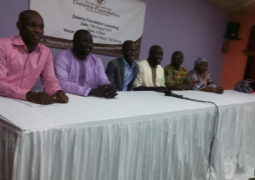Louise Antoinette Njie nee Mahoney, Gambia’s first woman cabinet minister and first female education officer, was born on 23 January 1922 in Banjul. She is also known as “Aunty Lou.” Her father, Sir John Mahoney, was the first speaker of the Gambian Legislative Council in 1954, and her mother Hannah was the first Gambian woman to work as a clerk in the Government Secretariat in the 1910s. She died in 1974.
Louise attended the St. Joseph’s Infants School, the Methodists Girls High School, Banjul, and obtained the Cambridge School Certificate in 1942. She attended the prestigious Achimota Teachers College in Accra, Ghana, from 1942–1945. Upon her return, she taught at the Methodist Girls’ High School from 1942 to 1949; from 1949 to 1955, she taught at Bakau Primary School. She was school headmistress from 1957 to 1963. In 1958, she was appointed to the Royal Visit Committee responsible for the welcome of Queen Elizabeth II to The Gambia in 1961. From 1963 to 1964, she studied Educational Administration at Oxford University. In 1964, Louise was appointed Woman Education Officer responsible for the promotion of girls’ education. She championed the training of female teachers at The Gambia College, and served as Chief Education Officer responsible for Banjul and Kombo schools until her retirement in 1977. She was also active in church and charity work, serving as president of the Gambia Red Cross Society for two terms from 1970, and as a member of the Standing Committee and District Synod of the Methodist Church. She founded Soroptimists International of The Gambia, and was a founding member of the now-defunct Gambia Women’s Federation.
Her political career began in 1977 when she was nominated to Parliament, as Gambia’s second woman MP (or Member of Parliament). She excelled by raising issues of relevance to women and children, such as the establishment of day care centers for children of working mothers, and the teaching of domestic science as a compulsory subject for girls. She also championed the revision of the law that prohibits illegitimate children from inheriting from their fathers. Her impeccable record as a legislator paid off in 1985, when she was appointed the first female cabinet minister, holding the crucial education portfolio.
During her tenure, the new campus of the Gambia College at Brikama was opened. By the time she left the education portfolio in 1987, girls’ enrolment had increased, and the number of female teachers went up by 20 percent. A series of student demonstrations about school buses and poor boarding conditions led to her departure from the Education Ministry. As Health Minister from 1987 to 1990, she championed family planning, health nutrition, and education to help reduce the maternal mortality rate. N’jie spearheaded Gambia’s early response to the AIDS pandemic when, in 1987, she established the National AIDS Control Programme.
Her reputation as a disciplinarian and straight talker made her appear overbearing to some, but to many she was an energetic dynamo, always primed into dutiful action. “Highly meticulous, objective, and thorough, always working in the interest of teachers and education of The Gambia,” was how a writer described N’jie upon her retirement in 1977.
In 1950, she married Denis (Ebrima) N’jie, a dentist, with whom she had a son, Koblah, who died in 1997. With her death, the Gambia has lost one of the last remaining matriarchs of the Krio community who were pioneers in many sectors of national life such as health and education. To her relatives and friends, I extend my most sincere condolences.
(Louise A. Njie nee Mahoney, First Gambian woman cabinet member, veteran teacher and educationist born in Bathurst January 1922; died Bakau, 2 May 2014).
A biography of Mrs Njie is available in the book ‘Gambian Women: An Introductory History’ (Fulladu Publishers) by Hassoum Ceesay



